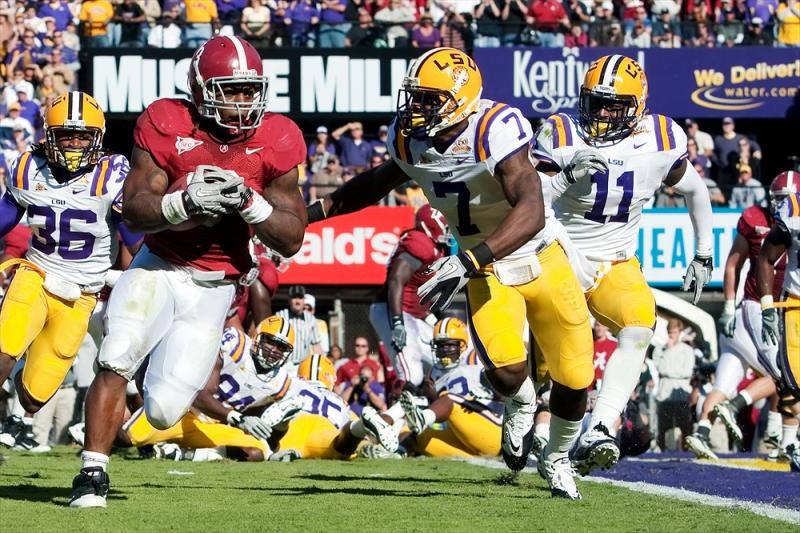BCS Championship: It All Comes Down to the Running Game
We all know the story about LSU’s and Alabama’s respective defenses. Alabama’s is all-world, perhaps all-decade great. They are first in…everything. They are stout from front to back, loaded with future NFL players at each level. LSU can spin much the same tale. Their defense was nearly as epic this season, better in fact at forcing turnovers. Throw in their special teams and the unit as a whole was even better than the Crimson Tide. Led by Heisman Trophy finalists and Jim Thorpe award winners, LSU will have their fair share of defenders playing on future Sundays as well.
As the first matchup between these two teams indicated though, defense is mostly a draw. For arguments sake, let’s call it that and never bring it up again. Thus, the difference between these two and the reason one comes out victorious, will be on the offensive side of the ball. Something is being made of the fact that Jordan Jefferson will be starting this game and, in all likelihood, playing all of it. Unlike their November 5 game, Jefferson is the man, not settling into a time share with Jarrett Lee. However, the reason this is not a bigger deal is because Jefferson is not that good of a quarterback, although he can run around a bit.
Last time these teams faced off, many, including myself, gave the edge to Alabama because of home field and a supposed better running back in Trent Richardson. He would be able to at least move the ball where LSU probably would not. After the fact, we realized neither team would have an easy go of running the ball. Richardson had the most rushing yards individually but LSU actually did get the upper hand as a team.
Surprisingly, this may be the case once again in the National Championship. What is better for a team’s success: one, Heisman Trophy-caliber star back or a slew of very good ones including a quarterback able to scramble around? The answer will decide the BCS title.
During the season, Alabama rushed for a shade over 219 yards per game, good for 15th in the nation. Sixty percent of that was from one very bad man, the aforementioned Richardson, who finished the year with over 1500 yards on the ground. Meanwhile, the LSU Tigers racked up 215 yards per game, 17th in the nation, and nearly identical to the Tide. However, the similarities end there. LSU did not have a single back crack the 800 yard mark. Michael Ford and Spencer Ware rushed for 755 and 700 yards respectively. Jordan Jefferson, who missed time because of his suspension, finished with nearly 250 yards rushing from the quarterback position, a total that would have been even higher had he started every game. In all, 15 different Tigers had carries this season and at least six men finished 2011 with over 100 yards on the ground. Talk about a time share. LSU actually finished with more total rushing yards for the season than did Alabama because of their extra game, ending up with barely under 2800 yards as a unit.
The totals are eerily close. The yardage marks are almost identical and yet the way they go about obtaining these numbers are mirror images. Relying on one man to do all the heavy lifting is difficult. But having that one man be perhaps the best running back in the nation balances out that supposed con. Not having a go-to back is problematic, unless you have multiple runners that you can trust in different situations, at different points on the field.
In the end, it seems a multiple-pronged attack would be more effective in this type of game. In a battle where yards will be hard to come by and points will be even harder, being able to turn to a bevy of choices to carry the load, and rotating in fresh bodies on nearly every down, LSU would seemingly have the rushing edge in this ball game and probably the winning edge as well. Especially with the recent onslaught of Alfred Blue, who has accumulated over half of his total rushing yards in his last three games alone, the Tigers attack is the one to be more feared, Heisman finalist be damned.

